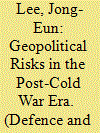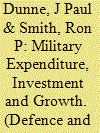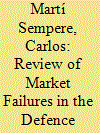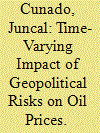|
|
|
Sort Order |
|
|
|
Items / Page
|
|
|
|
|
|
|
| Srl | Item |
| 1 |
ID:
174613


|
|
|
|
|
| Summary/Abstract |
We model the decentralized defence choice of agents connected in a directed graph and exposed to an external threat. The network allows players to receive goods from one or more producers through directed paths. Each agent is endowed with a finite and divisible defence resource that can be allocated to their own security or to that of their peers. The external threat is represented by either a random attack on one of the nodes or by an intelligent attacker who aims to maximize the flow-disruption by seeking to destroy one node. We show that under certain conditions a decentralized defence allocation is efficient when we assume the attacker to be strategic: a centralized allocation of defence resources which minimizes the flow-disruption coincides with a decentralized equilibrium allocation. On the other hand, when we assume a random attack, the decentralized allocation is likely to diverge from the central planner’s allocation.
|
|
|
|
|
|
|
|
|
|
|
|
|
|
|
|
| 2 |
ID:
174616


|
|
|
|
|
| Summary/Abstract |
This study explores the post-Cold War era by investigating geopolitical risks (GPRs) from the Middle East to the Korean Peninsula. Geopolitics is a fleeting reality and is a matter of a few top decision makers while ordinary people catch a glimpse of it by the press. Due to the relative inaccessibility of key information, geopolitics is hard to study even if it is a crucial element to shape our era. To fill the gap, we adopt a copula approach to surmise a joint probability distribution between the GPR in the world and several countries. This method could capture tail dependence. The highest upper tail dependence with the world’s GPR has been that of Israel; as one moves from the Cold War to the post-Cold War period, the increasing cases of upper tail dependence are China, Korea, Russia, and Ukraine while decreasing cases are Israel, Saudi Arabia, and Turkey. It implies that the world’s flashpoints might have been shifting from the Middle East to Asia as our eras have gone through the Cold War and the post-Cold War periods. Seemingly self-centered Make America Great Again could be Make the World Great Again. The best is yet to come.
|
|
|
|
|
|
|
|
|
|
|
|
|
|
|
|
| 3 |
ID:
174611


|
|
|
|
|
| Summary/Abstract |
The cointegration and causal relationships amongst militarisation, energy consumption, carbon dioxide (CO2) emissions and economic growth in Myanmar are investigated for the period of 1975–2014. Myanmar was governed by a military regime until 2011 with high levels of military expenditure. This study adopted an extended neoclassical production function framework utilising the autoregressive distributed lag approach to investigate the causal relationships. Estimation showed that a 1% increase in military expenditure led to a 0.63% decrease in GDP, whereas a 1% increase in energy consumption increased GDP by 4% in the long run. The bootstrap-corrected causality test located bidirectional causality between energy consumption and CO2 emissions and unidirectional causality running from economic growth to energy consumption. Policy recommendations promoting Myanmar’s economic growth include reducing military spending which would contribute to a reduction in CO2 emissions and encourage efficient energy consumption.
|
|
|
|
|
|
|
|
|
|
|
|
|
|
|
|
| 4 |
ID:
174610


|
|
|
|
|
| Summary/Abstract |
This paper considers the issues involved in estimating the effect of military expenditure on growth and the reasons for the lack of consensus in the literature. It briefly reviews the economic theory, emphasising the difficult identification issues involved in determining the interaction between military expenditure and output and discusses econometric methods for panels. It then takes advantage of the extended SIPRI military spending to construct a relatively large balanced panel of countries for the period 1960–2014. Rather than the usual focus on the direct relation between military spending on growth, it focusses upon the investment channel. It provides estimates of various models examining the interaction between the three variables and finds that the data do not suggest any strong relations between military expenditure and either investment or growth. This is not unexpected given the theoretical and econometric problems identified.
|
|
|
|
|
|
|
|
|
|
|
|
|
|
|
|
| 5 |
ID:
174614


|
|
|
|
|
| Summary/Abstract |
In pursuit of good governance and better allocation of resources, corruption is of interest to policymakers and citizens alike. Using panel data from 1996 to 2016 for 59 countries, the aim of this paper is to examine the relation between military spending and corruption. Taking the advantage of GMM method, we have shown across different measures of military spending, countries with higher levels of corruption tend to exhibit higher levels of military expenditures.
|
|
|
|
|
|
|
|
|
|
|
|
|
|
|
|
| 6 |
ID:
174612


|
|
|
|
|
| Summary/Abstract |
The First Fundamental Theorem of Welfare Economics states that, under certain conditions, markets are able to supply goods and services in a way that is Pareto efficient. However, these stringent conditions are not satisfied in practice, giving way to the inefficient allocation of resources by market agents for such supply and a welfare loss. This article describes the reasons that impede the fulfilment of such conditions in the defence industrial market and the impact of such fact in the allocation process. It also discusses interventions and arrangements for palliating these market failures and for increasing the overall allocational efficiency.
|
|
|
|
|
|
|
|
|
|
|
|
|
|
|
|
| 7 |
ID:
174617


|
|
|
|
|
| Summary/Abstract |
Pakistan and India have been arch-enemies since their independence from the British Rule. There have been over four full-fledged armed conflicts, countless border skirmishes and cross-border ceasefire violations between these neighbouring countries. Their mutual relationships have often nosedived to a point where the nuclear conflagration seemed real possibility. While India is among the five largest military spenders in the world, Pakistan spends a disproportionately larger share of its GDP on defence to neutralize the Indian military advantage. While Pakistan's military expenditure is largely India-specific, it is not clear if the reverse is also true. Therefore, this study explores if the military expenditure of India and Pakistan are causally associated with each other or the arms race is asymmetric. Using the maximum entropy bootstrapping method and a series of robustness checks, we find that while military expenditure of Pakistan is shaped by the Indian military expenditure, the military expenditure in India is not Pakistan-specific. This study has important policy implications for the region because Pakistan may explore alternative strategic relationships with India. A revision of strategic relationship between the two South Asian neighbours may help in the resolution of the long-standing political, social and economic problems of both the countries.
|
|
|
|
|
|
|
|
|
|
|
|
|
|
|
|
| 8 |
ID:
174615


|
|
|
|
|
| Summary/Abstract |
This paper analyses the dynamic impact of geopolitical risks (GPRs) on real oil returns for the period February 1974 to August 2017, using a time-varying parameter structural vector autoregressive (TVP-SVAR) model. Besides the two variables of concern, the model also includes growth in world oil production, global economic activity (to capture oil-demand), and world stock returns. We show that GPRs (based on a tally of newspaper articles covering geopolitical tensions), in general, has a significant negative impact on oil returns, primarily due to the decline in oil demand captured by the global economic activity. Our results, thus, highlight the risk of associating all GPRs with oil supply shocks driven by geopolitical tensions in the Middle East, and hence, ending up suggesting that higher GPRs drive up oil prices.
|
|
|
|
|
|
|
|
|
|
|
|
|
|
|
|
|
|
|
|
|